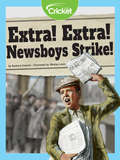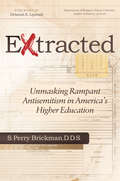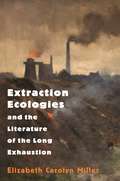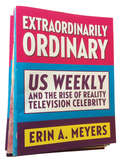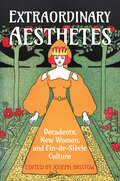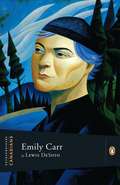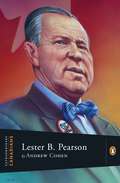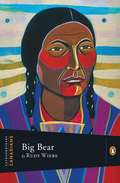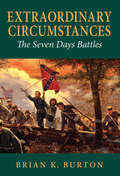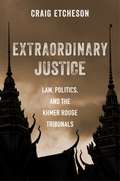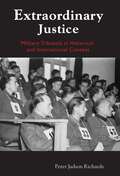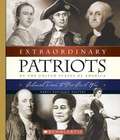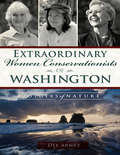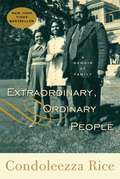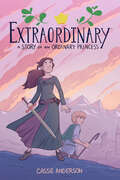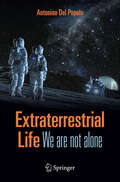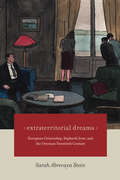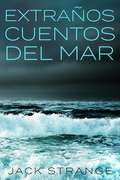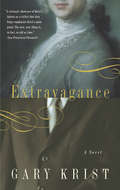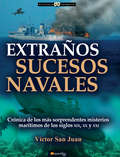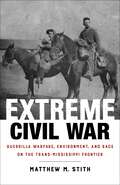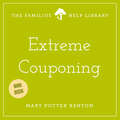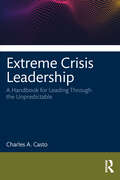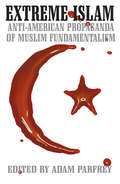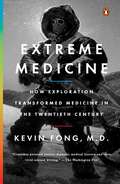- Table View
- List View
Extra! Extra! Newsboys Strike!
by Barbara KrasnerDo you know what a newsboy is? They were young boys who sold newspapers in the 1800s. Learn the history of the group of children who striked against newspaper moguls to improve their jobs.
Extracted: Unmasking Rampant Antisemitism in America's Higher Education
by S. Perry BrickmanFor half a century, S Perry Brickman harbored a deep and personally painful secret… On a late summer day in 2006, Brickman and his wife attended an exhibit on the history of Jewish life at Emory University and were astonished to come face-to-face with documents that strongly suggested that Brickman and many others had been failed out of Emory’s dental school because they were Jewish. They decided to embark on an uncharted path to uncover the truth. With no initial allies and plenty of resistance, Brickman awoke each morning determined to continue extracting evidence hidden in deep and previously unmined archives. While the overt discrimination was displayed in charts and graphs, the names of the victims were scrupulously withheld. The ability of the perpetrators to silence all opposition and the willingness of the Jewish community to submit to the establishment were deeply troubling as Brickman continued to dig deeper into the issue. Extracted brings to light the human element of the rampant antisemitism that affected the dental profession in twentieth-century America—the personal tragedies, the faces, and the individual stories of shame and humiliation. After five years of identifying, interviewing, and recording the victims, Brickman was finally permitted to present his documentary to Emory officials and ask for redemption for the stain she had made.
Extraction Ecologies and the Literature of the Long Exhaustion
by Elizabeth Carolyn MillerHow literature of the British imperial world contended with the social and environmental consequences of industrial miningThe 1830s to the 1930s saw the rise of large-scale industrial mining in the British imperial world. Elizabeth Carolyn Miller examines how literature of this era reckoned with a new vision of civilization where humans are dependent on finite, nonrenewable stores of earthly resources, and traces how the threatening horizon of resource exhaustion worked its way into narrative form.Britain was the first nation to transition to industry based on fossil fuels, which put its novelists and other writers in the remarkable position of mediating the emergence of extraction-based life. Miller looks at works like Hard Times, The Mill on the Floss, and Sons and Lovers, showing how the provincial realist novel’s longstanding reliance on marriage and inheritance plots transforms against the backdrop of exhaustion to withhold the promise of reproductive futurity. She explores how adventure stories like Treasure Island and Heart of Darkness reorient fictional space toward the resource frontier. And she shows how utopian and fantasy works like “Sultana’s Dream,” The Time Machine, and The Hobbit offer imaginative ways of envisioning energy beyond extractivism.This illuminating book reveals how an era marked by violent mineral resource rushes gave rise to literary forms and genres that extend extractivism as a mode of environmental understanding.
Extraordinarily Ordinary: Us Weekly and the Rise of Reality Television Celebrity
by Erin A. MeyersExtraordinarily Ordinary offers a critical analysis of the production of a distinct form of twenty-first century celebrity constructed through the exploding coverage of reality television cast members in Us Weekly magazine. Erin A. Meyers connects the economic and industrial forces that helped propel Us Weekly to the top of the celebrity gossip market in the early 2000s with the ways in which reality television cast members fit neatly into the social and cultural norms that shaped the successful gossip formulas of the magazine. Us Weekly’s construction of the “extraordinarily ordinary” celebrity within its gossip narratives is a significant symptom of the broader intensification of discourses of ordinariness and the private in the production of contemporary celebrity, in which fame is paradoxically grounded in “just being yourself” while simultaneously defining what the “right” sort of self is in contemporary culture.
Extraordinary Aesthetes: Decadents, New Women, and Fin-de-Siècle Culture (UCLA Clark Memorial Library Series #32)
by Joseph BristowThe fin de siècle not only designated the end of the Victorian epoch but also marked a significant turn towards modernism. Extraordinary Aesthetes critically examines literary and visual artists from England, Ireland, and Scotland whose careers in poetry, fiction, and illustration flourished during the concluding years of the nineteenth century. This collection draws special attention to the exceptional contributions that artists, poets, and novelists made to the cultural world of the late 1880s and 1890s. The essays illuminate a range of established, increasingly acknowledged, and lesser-known figures whose contributions to this brief but remarkably intense cultural period warrant close attention. Such figures include the critically neglected Mabel Dearmer, whose stunning illustrations appear in Evelyn Sharp’s radical fairy tales for children. Equally noteworthy is the uncompromising short fiction of Ella D’Arcy, who played a pivotal role in editing the most famous journal of the 1890s, The Yellow Book. The discussion extends to a range of legendary writers, including Max Beerbohm, Oscar Wilde, and W.B. Yeats, whose works are placed in dialogue with authors who gained prominence during this period. Bringing women’s writing to the fore, Extraordinary Aesthetes rebalances the achievements of artists and writers during the rapidly transforming cultural world of the fin de siècle.
Extraordinary Canadians Emily Carr
by Lewis DesotoMad, bad, and dangerous to know is how Victorian society dismissed Emily Carr. Lewis DeSoto, a painter and novelist, sees Emily Carr as a woman in search of God, freedom, and the essence of art. Her quest to be an independent woman and a modern artist takes her from the studios of Paris to deep inside the remote Native villages of the West Coast forests. It is a lifetime journey of almost mythic proportions in which she struggles to define not only herself but also her country. A creator of extraordinary power, a seeker of mystical truth, a woman of unusual courage, Carr is revealed as one of those unique individuals who articulate the symbols and images by which Canada knows itself.
Extraordinary Canadians Lester B Pearson
by Andrew Cohen Saul John RalstonIn his 2 terms as prime minister, from 1963-1968, Lester B. Pearson oversaw the revamping of Canada through the introduction of Medicare, the Canada Pension Plan, the Commission on Bilingualism and Biculturalism, the Auto Pact, and the new Maple Leaf flag. Pearson came to power after an impressive career as a diplomat, where he played a vital role in the creation of NATO and the United Nations, later serving as president of its General Assembly. He put Canada on the world stage when he won the 1957 Nobel Peace Prize for his handling of the Suez Crisis, during which he brokered the formation of a UN peacekeeping force. Author Andrew Cohen, whose books have focused on Canada's place in the world, is the perfect author to assess Pearson's legacy.
Extraordinary Canadians: Big Bear (Extraordinary Canadians)
by Rudy Wiebe John Ralston SaulBig Bear (1825-1888) was a Plains Cree chief in Saskatchewan at a time when aboriginals were confronted with the disappearance of the buffalo and waves of European settlers that seemed destined to destroy the Indian way of life. In 1876 he refused to sign Treaty No. 6, until 1882, when his people were starving. Big Bear advocated negotiation over violence, but when the federal government refused to negotiate with aboriginal leaders, some of his followers killed 9 people at Frog Lake in 1885. Big Bear himself was arrested and imprisoned. Rudy Wiebe, author of a Governor General's Award-winning novel about Big Bear, revisits the life of the eloquent statesman, one of Canada's most important aboriginal leaders.
Extraordinary Circumstances: The Seven Days Battles
by Brian K. BurtonA detailed history of the American Civil War’s first campaign in Virginia in 1862.The first campaign in the Civil War in which Robert E. Lee led the Army of Northern Virginia, the Seven Days Battles were fought southeast of the Confederate capital of Richmond in the summer of 1862. Lee and his fellow officers, including “Stonewall” Jackson, James Longstreet, A. P. Hill, and D. H. Hill, pushed George B. McClellan’s Army of the Potomac from the gates of Richmond to the James River, where the Union forces reached safety. Along the way, Lee lost several opportunities to harm McClellan. The Seven Days have been the subject of numerous historical treatments, but none more detailed and engaging than Brian K. Burton’s retelling of the campaign that lifted Southern spirits, began Lee’s ascent to fame, and almost prompted European recognition of the Confederacy.“A thoroughly researched and well-written volume that will surely be the starting point for those interested in this particular campaign.” —Journal of American History“A welcome addition to scholarship that should be the standard work on its subject for some time to come.” —Journal of Military History“Plenty of good maps . . . help the reader follow the course of the campaign. . . . Burton does not neglect the role of the common soldiers . . . [and]provides thorough and reasonable analyses of the commanders on both sides.” —Georgia Historical Quarterly“A full and measured account marked by a clear narrative and an interesting strategy of alternating the testimony of generals with their grand plans and the foot soldiers who had to move, shoot, and communicate in the smokey underbrush.” —The Virginia Magazine
Extraordinary Justice: Law, Politics, and the Khmer Rouge Tribunals
by Craig EtchesonIn just a few short years, the Khmer Rouge presided over one of the twentieth century’s cruelest reigns of terror. Since its 1979 overthrow, there have been several attempts to hold the perpetrators accountable, from a People’s Revolutionary Tribunal shortly afterward through the early 2000s Extraordinary Chambers in the Courts of Cambodia, also known as the Khmer Rouge Tribunal. Extraordinary Justice offers a definitive account of the quest for justice in Cambodia that uses this history to develop a theoretical framework for understanding the interaction between law and politics in war crimes tribunals.Craig Etcheson, one of the world’s foremost experts on the Cambodian genocide and its aftermath, draws on decades of experience to trace the evolution of transitional justice in the country from the late 1970s to the present. He considers how war crimes tribunals come into existence, how they operate and unfold, and what happens in their wake. Etcheson argues that the concepts of legality that hold sway in such tribunals should be understood in terms of their orientation toward politics, both in the Khmer Rouge Tribunal and generally. A magisterial chronicle of the inner workings of postconflict justice, Extraordinary Justice challenges understandings of the relationship between politics and the law, with important implications for the future of attempts to seek accountability for crimes against humanity.
Extraordinary Justice: Military Tribunals in Historical and International Context
by Peter Judson RichardsExamines the ways military tribunals seek to administer justiceThe Al-Qaeda terror attacks of September 11, 2001 aroused a number of extraordinary counter measures in response, including an executive order authorizing the creation of military tribunals or “commissions” for the trial of accused terrorists. The Supreme Court has weighed in on the topic with some controversial and deeply divided decisions.Extraordinary Justice seeks to fill an important gap in our understanding of what military tribunals are, how they function, and how successful they are in administering justice by placing them in comparative and historical context. Peter Judson Richards examines tribunals in four modern conflicts: the American Civil War, the British experience in the Boer War, the French tribunals of the “Great War,” and Allied practices during the Second World War.Richards also examines the larger context of specific political, legal and military concerns, addressing scholarly and policy debates that continually arise in connection with the implementation of these extraordinary measures. He concludes that while the record of the national tribunals has been mixed, enduring elements in the character of warfare, of justice, and the nature of political reality together justify their continued use in certain situations.
Extraordinary Patriots of the United States of America: Colonial Times to Pre-Civil War
by Nancy Robinson MastersReal-life stories of struggle, achievement, victory, and sometimes loss that are an ideal companion for history, social science, language and geography studies. The Extroardinary People series is the perfect starter for students who want to know more about the people who shaped their world, focusing on the unique histories of people from every culture, and every walk of life.
Extraordinary Women Conservationists of Washington: Mothers of Nature
by Dee ArntzCourageous women are to thank for many of Washington's environmental conservation successes. Bonnie Phillips, Melanie Rowland and Helen Engle battled harmful timber cutting. Polly Dyer and Emily Haig worked to expand Olympic National Park and organized efforts to establish North Cascades National Park. Women helped create the Washington Environmental Council and Washington Conservation Voters. As a state representative, Jolene Unsoeld led the fight against Boeing and other major corporations to pass the state Model Toxics Control Act. Author and Washington conservationist Dee Arntz recounts these important stories and many others, showing that the legacy of Washington's female conservationists is nothing short of extraordinary.
Extraordinary, Ordinary People: A Memoir Of Family
by Condoleezza RiceCondoleezza Rice has excelled as a diplomat, political scientist, and concert pianist. Her achievements run the gamut from helping to oversee the collapse of communism in Europe and the decline of the Soviet Union, to working to protect the country in the aftermath of 9-11, to becoming only the second woman - and the first black woman ever -- to serve as Secretary of State. But until she was 25 she never learned to swim. Not because she wouldn't have loved to, but because when she was a little girl in Birmingham, Alabama, Commissioner of Public Safety Bull Connor decided he'd rather shut down the city's pools than give black citizens access. Throughout the 1950's, Birmingham's black middle class largely succeeded in insulating their children from the most corrosive effects of racism, providing multiple support systems to ensure the next generation would live better than the last. But by 1963, when Rice was applying herself to her fourth grader's lessons, the situation had grown intolerable. Birmingham was an environment where blacks were expected to keep their head down and do what they were told -- or face violent consequences. That spring two bombs exploded in Rice's neighborhood amid a series of chilling Klu Klux Klan attacks. Months later, four young girls lost their lives in a particularly vicious bombing. So how was Rice able to achieve what she ultimately did? Her father, John, a minister and educator, instilled a love of sports and politics. Her mother, a teacher, developed Condoleezza's passion for piano and exposed her to the fine arts. From both, Rice learned the value of faith in the face of hardship and the importance of giving back to the community. Her parent's fierce unwillingness to set limits propelled her to the venerable halls of Stanford University, where she quickly rose through the ranks to become the university's second-in-command. An expert in Soviet and Eastern European Affairs, she played a leading role in U. S. policy as the Iron Curtain fell and the Soviet Union disintegrated. Less than a decade later, at the apex of the hotly contested 2000 presidential election, she received the exciting news just shortly before her father's death that she would go on to the White House as the first female National Security Advisor. As comfortable describing lighthearted family moments as she is recalling the poignancy of her mother's cancer battle and the heady challenge of going toe-to-toe with Soviet leaders, Rice holds nothing back in this remarkably candid telling. This is the story of Condoleezza Rice that has never been told, not that of an ultra-accomplished world leader, but of a little girl and a young woman -- trying to find her place in a sometimes hostile world and of two exceptional parents, and an extended family and community, that made all the difference.
Extraordinary: A Story of an Ordinary Princess
by Cassie AndersonWhile her sisters were blessed at birth with exceptional skills, Princess Basil's "gift" is to be ordinary. But can a princess be ordinary?After escaping an unconventional kidnapping, Princess Basil finds herself far from her castle and must take fate into her own hands. She tracks down the fairy godmother who "blessed" her, and learns the solution to her ordinariness might be as simple as finding a magic ring. With an unlikely ally in tow, she takes on gnomes, a badger, and a couple of snarky foxes in her quest for a less ordinary life. Portland comics artist Cassie Anderson (Lifeformed) takes her webcomic to print in this tale of magical adventure, full of soul and humor for readers of all ages.
Extraterrestrial Life: We are not alone
by Antonino Del PopoloAre we alone in the universe? This ancient question remains unanswered, but we are inching closer to finding out. Since the 1970s, probes have explored various objects in our solar system, revealing no advanced civilizations beyond Earth. However, bacterial life likely existed on Mars and might still exist today. Venus, though a scorching hellscape, could host bacterial life in its atmosphere. Some moons of gas giants are believed to harbor underground oceans potentially capable of supporting life. The greatest hopes for discovering life lie in the myriad of exoplanets in our galaxy and beyond, the first of which was discovered in 1995. This discovery revolutionized our understanding, showing that planets are common, with each star often hosting one or more. This significantly increases the likelihood of both microscopic life and advanced civilizations. While not all planets are suitable for life, billions of habitable planets exist in our galaxy alone, some even classified as super-habitable, possessing conditions more favorable for life than Earth. Current and future space telescopes aim to study these planets' atmospheres, searching for life-producing molecules. One such molecule, produced exclusively by life, has already been detected on a discovered planet. Despite extensive searches, no signals from other civilizations have been found, but this doesn't rule out their existence. Recent studies based on star formation, the prevalence of planets, and the potential for life-supporting conditions suggest that technological civilizations have certainly existed in the Universe. The next decade will be crucial in answering the question: are we alone?
Extraterritorial Dreams: European Citizenship, Sephardi Jews, and the Ottoman Twentieth Century
by Sarah Abrevaya SteinWe tend to think of citizenship as something that is either offered or denied by a state. Modern history teaches otherwise. Reimagining citizenship as a legal spectrum along which individuals can travel, Extraterritorial Dreams explores the history of Ottoman Jews who sought, acquired, were denied or stripped of citizenship in Europe in the late nineteenth and early twentieth centuries—as the Ottoman Empire retracted and new states were born—in order to ask larger questions about the nature of citizenship itself. Sarah Abrevaya Stein traces the experiences of Mediterranean Jewish women, men, and families who lived through a tumultuous series of wars, border changes, genocides, and mass migrations, all in the shadow of the collapse of the Ottoman Empire and the ascendance of the modern passport regime. Moving across vast stretches of Europe, the Middle East, Asia, and the Americas, she tells the intimate stories of people struggling to find a legal place in a world ever more divided by political boundaries and competing nationalist sentiments. From a poor youth who reached France as a stowaway only to be hunted by the Parisian police as a spy to a wealthy Baghdadi-born man in Shanghai who willed his fortune to his Eurasian Buddhist wife, Stein tells stories that illuminate the intertwined nature of minority histories and global politics through the turbulence of the modern era.
Extratraños Cuentos Del Mar
by Jack Strange Roberto Peña Páez¿Qué se esconde debajo de las olas y a bordo de los barcos más misteriosos? Prepárese para experimentar toda la tradición y el atractivo del mar con estos mitos, leyendas e historias reales. El Folclore de siglos de antigüedad y cuentos sobre embarcaciones embrujadas, monstruos marinos, fantasmas, canibalismo en el mar y misteriosas desapariciones. Además también se incluyen historias de marineros en tierra, prostitutas, engarzados que fueron atacaron. Averigüe qué sucedió con los polizones, cómo fueron tratados y sobre el mito de que las mujeres no eran bienvenidas en los barcos. Bienvenido a Strange Tales of the Sea.
Extravagance
by Gary KristWilliam Tobias Merrick, an energetic young man from the provinces, travels to the big city in a time of great optimism and ferment, hoping to make his mark on a frenzied, money-crazed society obsessed with the promise of new technologies. The city in question is London in the 1690s; but it is also New York in the 1990s. The new technologies are diving bells, pneumatic winches, and "sucking-worm" drainage engines; but they are also wireless telecommunication devices, patented biotechnology processes, and revolutionary electronic Internet routers. Only the sense of unlimited possibility remains the same throughout. Unfolding simultaneously in two distant--but remarkably similar--periods of history, Extravagance is a comic, pictaresque novel of financial mania, the story of a world gripped by a terminal case of irrational exuberance. Navigating the perils of both eras is a single cast of characters: Will himself, a young man on the make, eager to do whatever it takes to make his fortune; Will's uncle (and sponsor) Gilbert Hawking, a shrewd businessman with one foot in the Old Economy and one in the New; Benjamin Fletcher, the developer of a pioneering new technology destined to set the world on fire; and Theodore Witherspoon, the cheerfully unscrupulous wizard of the financial markets who promises to make them all wealthy beyond their dreams. Meanwhile, Will's aspirations are complicated by his pursuit of Ben Fletcher's sister, Eliza, the gorgeous and disconcertingly aggressive woman who is as desirable as she is elusive. Can Will succeed in his efforts to win both Eliza and the fortune that her brother's new technology seems likely to bring him? And can he make it all happen before the general euphoria of the age reaches its inevitable climax? Extravagance is a uniquely conceived work of high comic entertainment -- an ultra-smart time machine of a novel that proves that both love and greed are timeless.
Extraños sucesos navales (Historia Incógnita)
by Víctor San JuanCrónica de los más enigmáticos siniestros marítimos de los siglos XIX, XX y XXI. Conozca las más sorprendentes aventuras navales de los siglos XIX, XX y XXI. Las historias más entrañables, trágicas o enigmáticas. Hazañas memorables, circunstancias inverosímiles y buques desaparecidos. Desde el Mary Celeste, el submarino U-31 y el portaviones Invincible hasta sucesos propios de leyendas marinas, sin olvidar al gato Oskar, que tripuló varios navíos durante la Segunda Guerra Mundial. Descubra las historias más entrañables o desgarradoras, trágicas o enigmáticas, pero siempre interesantes, experiencias en las que el azar y las circunstancias nos demuestran que a veces, en este mundo, la imperante rutina puede ser tan sólo la excepción. Asómbrese con los barcos que aparecieron sin sus tripulantes, colisiones a pleno día de buques dirigidos por profesionales, submarinos que regresaron del pasado o de la tumba por condicionantes técnicos o propósitos inconfesables, varadas simultáneas de flotillas enteras de buques, un pescador que se convierte en el único hombre en ver caer una bomba atómica y pescar un submarino, tesoros emprendiendo viajes de ida y vuelta o modernos buques que intentan pasar a través de tierra. Víctor San Juan con un estilo fluido y lleno de humor le acercará a todos estos hechos difíciles de creer pero que, una vez conocidos, nos sorprenden, admiran y llenan de preguntas y curiosidad
Extreme Civil War: Guerrilla Warfare, Environment, and Race on the Trans-Mississippi Frontier (Conflicting Worlds: New Dimensions of the American Civil War)
by Matthew M. StithDuring the American Civil War, the western Trans-Mississippi frontier was host to harsh environmental conditions, irregular warfare, and intense racial tensions that created extraordinarily difficult conditions for both combatants and civilians. Matthew M. Stith's Extreme Civil War focuses on Kansas, Missouri, Arkansas, and Indian Territory to examine the physical and cultural frontiers that challenged Confederate and Union forces alike. A disturbing narrative emerges where conflict indiscriminately beset troops and families in a region that continually verged on social and political anarchy. With hundreds of small fights disbursed over the expansive borderland, fought by civilians— even some women and children—as much as by soldiers and guerrillas, this theater of war was especially savage. Despite connections to the political issues and military campaigns that drove the larger war, the irregular conflict in this border region represented a truly disparate war within a war. The blend of violence, racial unrest, and frontier culture presented distinct challenges to combatants, far from the aid of governmental services. Stith shows how white Confederate and Union civilians faced forces of warfare and the bleak environmental realities east of the Great Plains while barely coexisting with a number of other ethnicities and races, including Native Americans and African Americans. In addition to the brutal fighting and lack of basic infrastructure, the inherent mistrust among these communities intensified the suffering of all citizens on America's frontier. Extreme Civil War reveals the complex racial, environmental, and military dimensions that fueled the brutal guerrilla warfare and made the Trans-Mississippi frontier one of the most difficult and diverse pockets of violence during the Civil War.
Extreme Couponing
by Mary Potter KenyonThought a few cents off your grocery bill was something to crow about? Think again. Step with Mary Potter Kenyon into the world of BOGOs and blinkies, of rebates and registers, of dumpster divers and double couponers. It's the crazy life of extreme couponing as only Kenyon, a coupon queen herself of over 30 years, can possibly describe. Meet today's coupon extremists, master the lingo, and pick up a few tips yourself to save money more than you ever knew was possible.
Extreme Crisis Leadership: A Handbook for Leading Through the Unpredictable
by Charles CastoThis concise handbook presents a framework to help leaders across sectors understand what their role should be in an extreme crisis and supplements this understanding with practical advice. Leadership is often presented as a kind of mastery—but no single person can master an extreme crisis event such as the COVID-19 pandemic. Leaders need a workable resource based on research and experience that can be accessed quickly and referenced easily to effectively handle crises and mitigate repercussions: This handbook is that resource. It begins with diagnostic tools to identify crisis types and leadership roles, then presents an easy-to-use matrix framework that allows readers to focus on the specific example-based section that best fits their role and the kind of crisis they face. This handbook is accessible to leaders at all levels, from shift supervisors and emergency responders to CEOs and government executives. It will be an essential ready reference for any leader who might expect to encounter an extreme crisis, as well as for those who would not have foreseen themselves in such a situation.
Extreme Islam
by Adam Parfrey"Here is a window inside the Jihad... presented here in its bare face without a distorting commentary."--Jeremy Glover, Headpress"(C)ontains essays and fascinating images that will render you serious, humbled and even a bit sympathetic... Extreme Islam's deranged carnival succeeds in shocking most when the 'extremists' themselves are lucid, poignant and poetic."--R.U. Sirius, LA Weekly
Extreme Medicine
by Kevin FongAnesthesiologist, intensive care expert, and NASA adviser Kevin Fong explores how physical extremes push human limits and spawn incredible medical breakthroughs.
